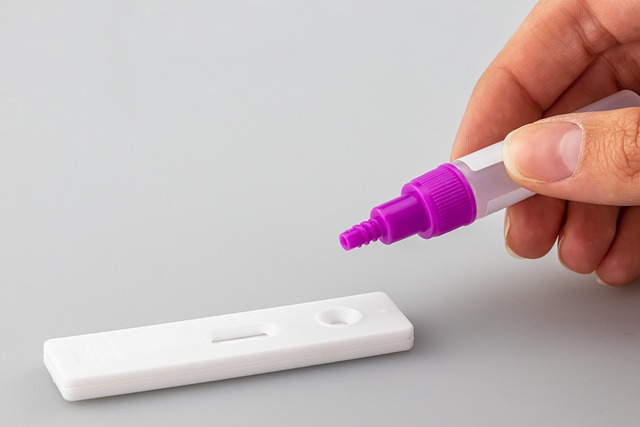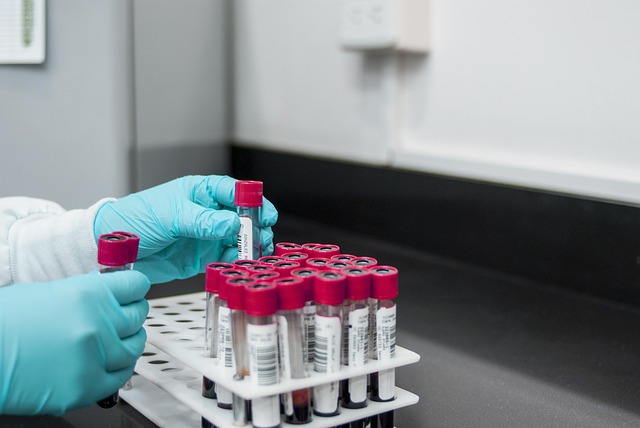Comprehensive thyroid testing measures key hormones (T4, T3, TSH) and anti-thyroid antibodies to evaluate thyroid gland health. This detailed approach aids in diagnosing conditions like hyperthyroidism, hypothyroidism, and autoimmune disorders, facilitating early detection and tailored treatment plans for optimal thyroid function. Crucial during pregnancy for fetal thyroid development monitoring.
“Unraveling the mysteries of your thyroid health? A comprehensive thyroid profile is a powerful tool for assessing overall well-being. This in-depth analysis measures crucial hormones and antibodies, offering insights into thyroid function and potential imbalances. From understanding hormone basics to interpreting results, this guide delves into the key components of a standard thyroid profile, helping you navigate the complexities of this vital gland’s impact on your body. Discover how comprehensive thyroid testing can reveal and address subtle disruptions.”
- Understanding Thyroid Hormone Basics
- Components of a Standard Thyroid Profile
- Assessing Thyroid Function and Autoimmunity
- Identifying Common Thyroid Imbalances
- Interpreting Test Results and Next Steps
Understanding Thyroid Hormone Basics

The thyroid gland, located at the base of the neck, plays a pivotal role in our bodies’ overall metabolic health. It produces two primary hormones, thyroxine (T4) and triiodothyronine (T3), which are crucial regulators of energy production, growth, and development. These hormones influence nearly every cell in our bodies, making them essential for maintaining optimal health.
Comprehensive thyroid testing involves measuring the levels of these key hormones to assess normal thyroid function range. It also includes evaluating TSH (thyroid-stimulating hormone), which is responsible for signaling the thyroid gland to produce T4 and T3. Understanding these hormone dynamics is vital, as imbalances can lead to various health issues. For instance, an overactive thyroid (hyperthyroidism) or an underactive thyroid (hypothyroidism) can cause symptoms like weight fluctuations, fatigue, and changes in heart rate, respectively. Knowing the normal thyroid test at home ranges allows individuals to take proactive steps toward hormone replacement therapy side effects prevention or management if needed.
Components of a Standard Thyroid Profile

A standard thyroid profile is a comprehensive thyroid testing method that evaluates the health and functionality of your thyroid gland. This small but powerful endocrine gland plays a pivotal role in regulating numerous metabolic processes in your body. A typical thyroid profile measures several key markers to provide insights into the current state of your glandular balance importance.
The profile usually includes tests for thyroxine (T4), triiodothyronine (T3), and thyroid-stimulating hormone (TSH). T4 and T3 are the primary hormones produced by the thyroid, which influence the metabolism of nearly every cell in your body. As we age, thyroid function decline can become more prevalent, making comprehensive thyroid panel testing essential for maintaining optimal health. The inclusion of these hormones in a thyroid profile allows healthcare professionals to assess if the thyroid is producing enough hormones (hypothyroidism or hyperthyroidism), or if there’s an imbalance that could impact overall well-being.
Assessing Thyroid Function and Autoimmunity

A comprehensive thyroid profile goes beyond simply measuring thyroid-stimulating hormone (TSH) levels. It encompasses a range of tests designed to assess both thyroid function and autoimmunity, providing a more complete picture of an individual’s thyroid health. By examining thyroid hormones like T3 and T4, as well as anti-thyroid antibodies, healthcare professionals can identify not only hyperthyroidism or hypothyroidism but also the underlying causes, including autoimmune disorders such as Hashimoto’s thyroiditis.
Understanding thyroid levels is crucial because thyroid issues, such as depression linked to thyroid problems or chronic fatigue syndrome, are often interconnected. Comprehensive thyroid testing allows for precise interpretation of symptoms and facilitates tailored treatment plans. This can include medication adjustments, lifestyle changes, or both, to restore optimal thyroid function and alleviate associated conditions like fatigue and depression.
Identifying Common Thyroid Imbalances

Thyroid profiles provide a comprehensive overview of your thyroid’s health and function by measuring various hormones and markers. Comprehensive thyroid testing goes beyond T3 and T4 levels, delving into key indicators like TSH (thyroid-stimulating hormone), T3/T4 ratio, and sometimes even anti-thyroid antibodies. This detailed approach allows for the early detection of common thyroid imbalances.
Understanding these imbalances is crucial in evaluating both hypothyroidism and hyperthyroidism, conditions marked by either an underactive or overactive thyroid, respectively. What’s more, comprehensive thyroid testing can reveal risk factors for thyroid cancer, providing valuable insights into early prevention and treatment. Additionally, it plays a vital role in monitoring baby’s thyroid development during pregnancy, ensuring proper growth and brain development.
Interpreting Test Results and Next Steps

When interpreting your comprehensive thyroid testing results, it’s crucial to understand that thyroid hormones play a critical role in regulating metabolism and many other bodily functions. A typical profile measures TSH (Thyroid Stimulating Hormone), T3 (Triiodothyronine), and T4 (Tetraiodothyronine). Comparing these levels against established reference ranges can reveal whether your thyroid is underactive (hypothyroidism), overactive (hyperthyroidism), or functioning normally.
If the test results indicate a thyroid dysfunction, such as elevated TSH suggesting hypothyroidism, the next steps involve consulting with a healthcare provider. They may recommend additional tests to pinpoint the specific cause, like an antibody panel for autoimmune thyroid conditions. Treatment options can range from hormone replacement therapy for hypothyroidism to anti-thyroid medications or radiation therapy for hyperthyroidism. Regular follow-up testing is essential to monitor thyroid function and adjust treatments accordingly, emphasizing the importance of how to test thyroid function and why do I need thyroid tests.
A comprehensive thyroid profile offers a detailed glimpse into thyroid function, encompassing hormone levels, autoimmunity, and common imbalances. By understanding these results, individuals can take informed steps towards maintaining optimal health. This testing is crucial for identifying potential issues early on and guiding personalized treatment plans, ensuring overall well-being.
